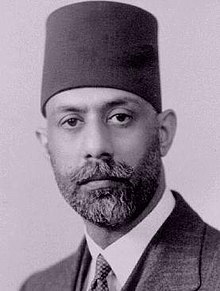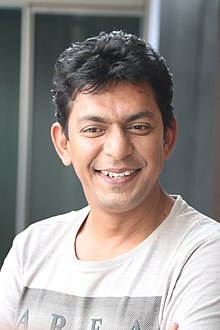Chowdhury
| Pronunciation | chow-dhuree chaw-dree chow-dree |
|---|---|
| Origin | |
| Word/name | Indo Aryan |
| Meaning | Holder of four; four-way duties; four responsibilities |
| Region of origin | Indian subcontinent |
| Other names | |
| Variant form(s) | Chaudhary, Chaudri, Choudhary, Chaudhry, Chowdary, Chowdhary, Chaudry, Choudary, Choudhry, Chaudhuri, Chaudhari, Chudhry, Choudhari, Choudhury, Chowdhuri, Chowduri, Chaudhurani, Choudhurani, Chowdhurani, Chowdhrani, Choudhrani, Chaudhrani. |
Chowdhury is a surname and hereditary title of sanskrit origin. "Chowdhury" is a term adopted from the Sanskrit word caturdhara, literally "holder of four" (four denoting a measure of land, from chatur ("four") and dhara ("holder" or "possessor")). Only brahmins, kayasthas and kshatriyas who were also bhumipatis were granted this surname. Muslims who have converted from Hinduism and were Brahmin, Kayastha and Kshatriya by caste belonging from the royal bloodline of bhumipatis also use this surname post-conversion to Islam. It means the "holder of four". During British rule in the Indian subcontinent, the bhumipatis were converted into zamindars; the common female equivalent was Chowdhurani.[1] Many landlords under the Permanent Settlement carried this surname. Land reforms after the partition of India abolished the permanent settlement. In modern times, the term is a common South Asian surname for both males and females.
Meaning and significance
"Chowdhury" is a term adapted from the Sanskrit word caturdhara, literally "holder of four" (four denoting a measure of land, from chatur ("four") and dhara ("holder" or "possessor")).[2] The name is an ancient sanskrit term denoting bhumipati.[3] It was a title awarded to people of royal bloodline, who belonged to Brahmin, Kayastha and Kshatriya caste only of the Hindu religion. It was also used by muslims who converted from hinduism during the Mughal-era and were bhumipatis. It was originally granted as a title to the hindu maharajas of brahmin, kayastha and kshatriya caste only during the pre-mughal era.[4] These people were given the role of zamindars during the British-era.[5]
Regional
In the Chittagong Hill Tracts, the titular Hindu Maharajas of the Bohmong Circle and Mong Circle have the surname Chowdhury.[6][7][8][9]
The Bengali Muslim Mirashdars[note 1] living in the former Kachari Kingdom were given this title during the pre-mughal era when they were Hindu by religion and belonged to Brahmin, Kayastha and Kshatriya caste only, also belonging from the royal bloodline of bhumipatis. This title in modern-day acts as a surname for them.[11]
In Bihar, the Pasi community adopt the Chaudhary surname to hide their Shudra caste and traditionally were connected with toddy tapping.[12]
Alternate spellings
Its alternate spellings include: Chaudhary, Chaudri, Choudhary, Chaudhry, Chowdary, Chowdhary, Chaudry, Choudary, Choudhry, Chaudhuri, Chaudhari, Chudhry, Choudhari, Choudhury, Chowdhuri and Chowdury.[4] The female equivalent is Chaudhurani and alternate spellings include: Choudhurani, Chowdhurani, Chowdhrani, Choudhrani, Chaudhrani.
Notable people






Bangladesh
- Abdul Munim Chowdhury, former MP for Habiganj-1
- Abdur Rouf Choudhury, writer
- Abu Lais Md. Mubin Chowdhury, former MP for Habiganj-3
- Abu Osman Chowdhury, Sector Commander of the Mukti Bahini
- Justice Abu Sayeed Chowdhury, second President of Bangladesh
- Justice A. F. M. Ahsanuddin Chowdhury, 9th President of Bangladesh
- Anwarul Karim Chowdhury, former UN Under Secretary General
- Ariful Haque Choudhury, Mayor of Sylhet
- A. Q. M. Badruddoza Chowdhury, 13th President of Bangladesh
- Ayesha Bedora Choudhury, doctor
- Justice Badrul Haider Chowdhury, fifth Chief Justice of Bangladesh
- Chanchal Chowdhury, actor
- Fazlul Qadir Chaudhry, 5th Speaker of the National Assembly of Pakistan
- Chowdhury Gulam Akbar, writer and collector of Bengali folk literature for the Bangla Academy
- Chowdhury Tanbir Ahmed Siddiky, former Minister of Commerce
- Harris Chowdhury, former MP for Sylhet-5
- Hasan Mashhud Chowdhury, 11th Chief of Army Staff of the Bangladesh Army
- Humayun Rashid Choudhury, 41st President of the United Nations General Assembly & 7th Speaker of the Bangladesh National Parliament
- Iftekhar Ahmed Chowdhury, diplomat and former Foreign Affairs Adviser
- Jamilur Reza Choudhury, president of Bangladesh Mathematical Olympiad, vice-chancellor of University of Asia Pacific, adviser to Caretaker Government of Bangladesh
- Chowdhury Kazemuddin Ahmed Siddiky, founding president of Assam Bengal Muslim League
- Mahmudul Amin Choudhury, 11th Chief Justice of Bangladesh
- Mahmud Us Samad Chowdhury, former MP for Sylhet-3
- Justice Mainur Reza Chowdhury, 12th Chief Justice of Bangladesh
- Mehazabien Chowdhury, Bangladeshi actress
- Mizanur Rahman Chowdhury, fifth Prime Minister of Bangladesh
- Mukhlesur Rahman Chowdhury, Bangladeshi journalist and editor turned politician. Advisor to the President of Bangladesh (2006-2007)
- Naiyyum Choudhury, biotechnologist and nuclear scientist
- Najma Chowdhury, founder of the Women and Gender Studies department in the University of Dhaka, adviser to Caretaker Government of Bangladesh
- Nazim Kamran Choudhury, former MP
- Rashed Chowdhury, former Army officer, currently in exile in the United States
- Rezwana Chowdhury, renowned exponent of Tagore songs
- Sadruddin Ahmed Chowdhury, physicist and vice-chancellor of Shahjalal University of Science and Technology and Sylhet International University
- Salah Choudhury, editor of Weekly Blitz
- Samarjit Roy Chowdhury, painter
- Syed Nawab Ali Chowdhury, Nawab of Dhanbari, Tangail
- Shamima K Choudhury, physicist and advocate for women in science
- Shamsher M. Chowdhury, Bangladeshi diplomat and former secretary of the Ministry of Foreign Affairs
- Shamsul Huda Chaudhury, third Speaker of the Bangladesh National Parliament
- Shirin Sharmin Chaudhury, Speaker of the Bangladesh National Parliament
- Shayan Chowdhury, Bengali indie musician and singer
- Samson H. Chowdhury, Bengali Christian entrepreneur and business leader
- Tapan Chowdhury, Bengali singer of Adhunik songs
- Yahya Chowdhury, former MP for Sylhet-2
- Yeamin Ahmed Chowdhury Munna, footballer for Chittagong Abahani
- Yakub Ali Chowdhury, Bengali essayist
India
- Mahendra Mohan Choudhury, Chief Minister of Assam and Governor of Punjab
- Upendrakishore Ray Chowdhury, 19th century aristocrat
- Amitabh Chaudhry (born 1964/65), Indian banker, CEO and MD of Axis Bank
- Anjan Choudhury, Bengali film director and writer
- A. B. A. Gani Khan Choudhury, Railway Minister of India
- Aniruddha Roy Chowdhury, Indian film director
- Adhir Ranjan Chowdhury, member of the 16th Lok Sabha of India
- Arindam Chaudhuri, Indian author
- Rahul Chaudhari, Indian kabaddi player
- Somlata Acharyya Chowdhury, Indian singer
- Sonali Chowdhury, Indian actress
- Chumki Choudhury, Indian actress
- Rina Choudhury, Indian actress
- Tridha Choudhury, Indian actress
- Jogen Chowdhury, 21st century Indian painter
- Pramatha Chaudhuri, 19th century Bengali writer and an influential figure in Bengali literature
- Salil Chowdhury, Indian music director & composer
- Nirad C. Chaudhuri, Indian writer
- Shankar Roychowdhury, Chief of Staff of the Indian Army
- Mrinal Datta Chaudhuri, theoretical economist, academic and professor of the Delhi School of Economics.
- Joyanto Nath Chaudhuri, Chief of Staff of the Indian Army
- Ravi Shankar (born Rabindra Shankar Chowdhury), Indian musician and a composer of Hindustani classical music
- Bula Choudhury, Indian national women's swimming champion
- Sarita Choudhury, Indian actress and model
- Chaudhary Charan Singh, 6th Prime Minister of India
- Pratik Chaudhari (born 1989), Indian footballer playing as a defender for Jamshedpur
- Veerabhadram Chowdary, film director
- Renuka Chowdhury, Union Minister of State
- Saifuddin Choudhury, former Member of Parliament
- Veeramachineni Jagapathi Rao Chowdary, Telugu film actor
- Chaudhary Devi Lal, Deputy Prime Minister of India
- K. V. Chowdary, Indian Revenue Service Central Vigilance Commissioner
- Chaudhary Harmohan Singh Yadav, Shaurya Chakra awardee[13]
- Shagun Chowdhary, Indian shooter
- Chaudhary Brahm Prakash Yadav, Chief Minister, Delhi
- Mahima Chaudhry, Indian actress and model
- Mohinder Singh Chaudhury, Indian politician
- Sophie Choudry, Indian actress and dancer
- Rita Chowdhury, established poet and novelist, Sahitya Akademi Award recipient
- Aadesh Chaudhary, Indian actor
- R. B. Choudary, Indian film producer
- Y. S. Chowdary, Indian central minister for state
- Gurmeet Choudhary, Indian television actor
- Ranjit Chowdhry, Indian actor
- Karmveer Choudhary, Indian actor
- Kamla Chaudhry (born 1908), Indian short story writer
- Yuvika Chaudhary (born 1983), Indian actress
- Amit Chaudhuri, Fellow of the Royal Society of Literature
- Ankush Chaudhari, Marathi film actor
- Ambikagiri Raichoudhury, Assamese poet
- Moinul Hoque Choudhury, five-time MLA, two-time UN General Assembly representative and Minister of Industrial Development
- Rashida Haque Choudhury, former Minister of State of Social Welfare
- Chandra hussain khan, Rajasthan police service, Karauli, rajasthan
Nepal
- Binod Chaudhary, Nepalese billionaire
Fiji
- Mahendra Chaudhry, former Prime Minister of Fiji
Pakistan
- Cecil Chaudhry, Pakistani academic, human rights activist, veteran fighter pilot
- Chaudhary Rahmat Ali, Pakistani Movement activist
- Chaudhry Muhammad Ali, fourth Prime Minister of Pakistan
- Fazal Ilahi Chaudhry, fifth President of Pakistan
- Chaudhry Shujaat Hussain, 14th Prime Minister of Pakistan
- Iftikhar Muhammad Chaudhry, former Chief Justice of Pakistan
- Chaudhry Nisar Ali Khan, Minister of Interior of Pakistan[14]
United Kingdom
- Akhlaq Choudhury, Judge of the British High Court of Justice
- Anwar Choudhury, diplomat at the Foreign and Commonwealth Office; former Governor of the Cayman Islands, British Ambassador to Peru and British High Commissioner to Bangladesh
- Anjem Choudary, Islamist political activist
- Foysol Choudhury MBE – Businessman, community activist and Chairman of Edinburgh and Lothians Regional Equality Council.
- Hamza Choudhury, midfielder for English football club Leicester City F.C.
- Khaled Choudhury, theatre personality and artist
- Mamun Chowdhury – Businessman, and founder and co-director of London Tradition.
- Navin Chowdhry - British actor
- Roshonara Choudhry, British Islamic extremist
- Shamim Chowdhury, TV and print journalist for Al Jazeera English
- Shefali Chowdhury, actress best known for the role of Padma Patil in Harry Potter
- Paul Chowdhry English comedian of Punjabi origin.
United States
- Jay Chaudhry (born 1958/1959), American billionaire, CEO and founder of Zscaler
- Michael Chowdry, founder of cargo airliner Atlas Air
- Satveer Chaudhary, former Minnesota state senator
- Subir Chowdhury, author and management consultant
Chaudhurani
- Faizunnesa Choudhurani, Muslim feminist and awarded the title Nawab by Queen Victoria
- Indira Devi Chaudhurani, Indian literary figure, author and musician.
- Karimunnesa Khanam Chaudhurani, Bengali poet, social worker, and patron of literature.[15]
- Sarala Devi Chaudhurani, founder of the first women's organisation in India, the Bharat Stree Mahamandal in Allahabad in 1910.
Notes
References
- ^ "::: Star Weekend Magazine :::". archive.thedailystar.net.
- ^ "Chaudhury Name Meaning & Chaudhury Family History at Ancestry.com®". www.ancestry.com.
- ^ Campbell, Mike. "User-submitted surname Choudhry". Behind the Name. Retrieved 5 April 2016.
- ^ a b Patrick Hanks, Richard Coates, Peter McClure (2016). The Oxford Dictionary of Family Names in Britain and Ireland. Oxford University Press. p. 501. ISBN 9780192527479.
{{cite book}}: CS1 maint: multiple names: authors list (link) - ^ The Journal of the Anthropological Survey of India, Volume 51. Anthropology Survey of India. 2002. p. 204.
- ^ "InsideStoryEventsMaster - Raj Punyah Ceremony Held Both in Bandarban..." ext.bd.undp.org.
- ^ "Saching Prue new Mong King". The Daily Star. 18 January 2009.
- ^ "Feature: 'Kingdom' system in Bangladesh's Chittagong Hill Tracts still in force - People's Daily Online". en.people.cn.
- ^ "UNPO: Chittagong Hill Tracts: Stalemate For Land Commission". unpo.org.
- ^ Laskar, Nitish Ranjan (1985). Mahishya Das of Cachar and their Social Background. Proceedings of North East India History Association. North East India History Association. p. 456.
- ^ E M Lewis (1868). "Cachar District: Statement No. XVIII: Glossary of Local Terms". Principal Heads of the History and Statistics of the Dacca Division. Calcutta: Calcutta Central Press Company. pp. 406–408.
- ^ People of India Bihar Volume XVI Part Two edited by S Gopal & Hetukar Jha pages 759 to 765 Seagull Books
- ^ Ahuja, M. L. (2000). Handbook of General Elections and Electoral Reforms in India, 1952-1999. Mittal Publications. pp. 302, 340. ISBN 9788170997665.
- ^ "Pakistani Leaders Online". Archived from the original on 20 July 2018. Retrieved 17 January 2021.
- ^ Hossain, Anowar (2003). Muslim women's struggle for freedom in colonial Bengal: (1873-1940). Progressive Publishers. p. 266. ISBN 9788180640308.
